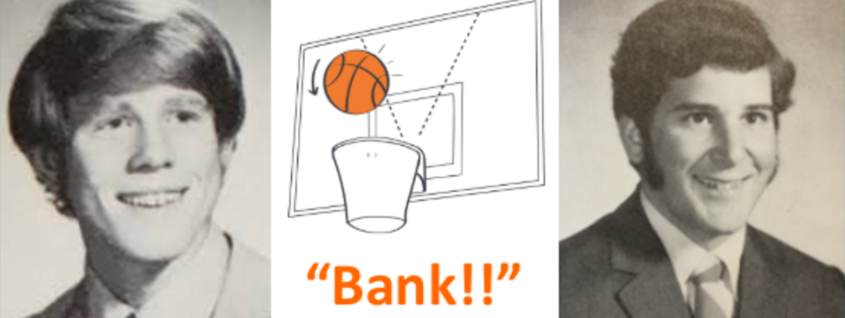Hey, That Guy Didn't Call "Bank"

For folks who once played basketball at the high school level, an essential part of the experience, at least while living in Los Angeles in the 1970s, was summer league.
If you were to Google the phrase “life doesn’t get any better than this,” there’s a better-than-even chance you’d find a weathered action photo of my Van Nuys High School teammates trucking downcourt on a fast break in the fourth quarter of a seesaw summer league matchup.
The most memorable summer league basketball game I ever played in was against John Burroughs High School of Burbank at the North Hollywood High gymnasium in August of 1971.
It wasn’t memorable because of how close the final score was — we beat Burroughs by, as I recall, about 30 points. What made the game unforgettable was that actor and future filmmaker Ron Howard was on the opposing team.
More on that in a moment.
The beauty of playing in summer league was that our head coach at Van Nuys High, Burt Golden, never attended the games. We never knew why, but I’d like to think he was secretly affording us the opportunity to bond and figure things out for ourselves.
The ritual of preparation for game day always began with my teammates Lloyd Waxman, Bob Wells and Ric Garcia. Lloyd would commandeer his mom’s Pontiac LeMans so we could take a field trip to Santa Monica beach, where we prepared for competition by scoping for chicks and improving the outer self. Then we’d drive back to the San Fernando Valley, customarily arriving at North Hollywood High just prior to tipoff.
But there was something different about the Burroughs game.
The guys and I had heard the rumor that Ron Howard was on the team. His career up to that point consisted of eight seasons as a child actor on the Andy Griffith Show, as well as appearances on more than 30 other TV programs and several feature film roles. His work on Happy Days, American Graffiti, Apollo 13 and A Beautiful Mind, to name just a few, was years away.
When Burroughs came out of the locker room for pre-game warm-ups, there he was. We had a few things in common back then. We were born just three days apart, and neither one of us was the best player on his team. I could tell how he carried himself that, like me, he understood his support role in something that was bigger than he was. For us, basketball offered a chance to fit in and contribute for the greater good.
So, the game got underway, and our tanned and rested team from Van Nuys High exerted its influence over the guys from Burroughs. Lloyd worked in the paint, knifing to the basket for numerous layups and short bank shots. Bob tossed up 18-foot jumpers from the wing and worked his butt off on defense. Ric served as our enforcer, throwing pointy elbows as he pounded the boards and rifled quick outlets to the guards. I played my usual role as facilitator, providing encouragement and crisp passes that led to assists.
Before long, we pulled away and then put it in cruise control, nursing a big lead as time was about to expire.
That’s when it happened.
With just a few seconds left, I threw a pass and a player from Burroughs stole it. That kid found a wide-open Ron Howard standing at midcourt. Ron caught the pass, took a couple of dribbles as he crossed the half-court line and heaved up a 40-foot line drive just before the final horn sounded.
Then three things happened in rapid succession: 1) The crowd hushed, 2) the shot banked home, and 3) the gym erupted.
There was one thing that never happened: Ron Howard never called “bank.” But it didn’t matter. An enormous celebration ensued, he was mobbed by his teammates, and the guys and I stood around wondering what just happened.
The official scorebook documented the buzzer beater as just another two-point bucket. That’s because high school didn’t adopt a standardized 3-point line until 16 years later in 1987.
None of that mattered to Ron Howard and the Burroughs bunch. They found something positive in defeat, and they celebrated it — as a team. That is basketball’s inherent power, to bring people together so they can work toward a common goal.
On that night, it was a fleeting moment of glory played out in a hot gym by a teenager hoping to find his place in the world, one half-court prayer at a time.